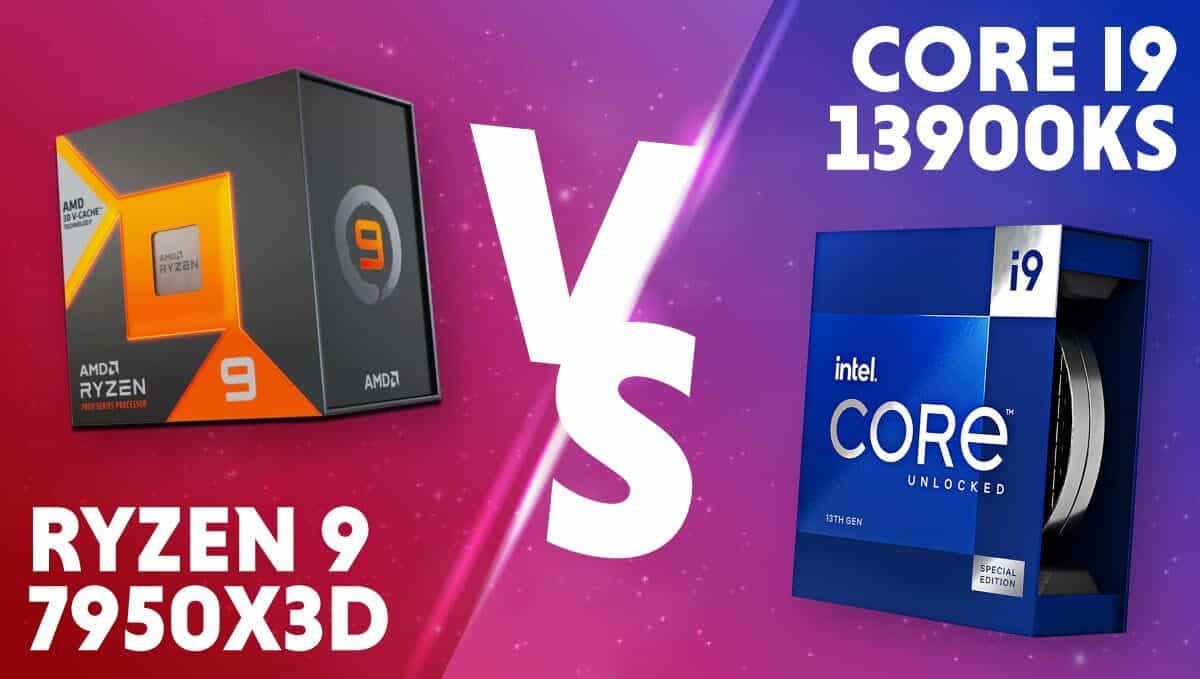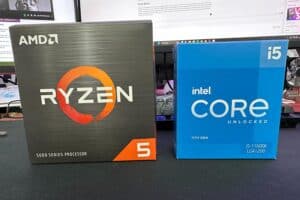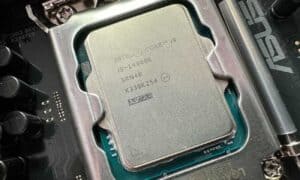AMD Ryzen 9 7950X3D vs Core i9 13900KS
AMD Ryzen 7950X3D vs Core i9 13900KS: Which is better?

WePC is reader-supported. When you buy through links on our site, we may earn an affiliate commission. Prices subject to change. Learn more
AMD unveiled the new Ryzen 7000 X3D CPUs at CES 2023, promising we will see them very soon. There were three X3D CPUs announced, the 7800X3D, 7900X3D, and 7950X3D. We’re focusing today on the 7950X3D and whether it’s better than the 13900KS from Intel. This is AMD Ryzen 9 7950X3D vs Core i9 13900KS.
Now read: Ryzen 9 7950X vs 5800X3D.
Today, we will analyze the specifications of each CPU and determine which is better for a specific use case. We will do this by using our knowledge of CPUs, as the 7950X3D hasn’t yet been released. We expect to see the 7950X3D along with the other X3D CPUs in February 2023.
Prior to all that, it’s important to outline the specifications of each CPU.
AMD Ryzen 9 7950X3D vs Core i9 13900KS: Specifications
Here we will share the specifications of each CPU so we know what we’re comparing.
Ryzen 9 7950X3D
- Architecture: Zen 4
- Core count: 16
- Thread count: 32
- Boost speed: 5.7GHz
- Cache: 144MB
- TDP 120W
The 7950X3D is a monster of a CPU. With a full 16 cores and 32 threads, it’s hard to dispute this CPUs value in the world. But how will the reduced core speed hold up against the original 7950X? We’ll have that comparison shortly, but for now, it’s time to compare it to the 13900KS
Intel Core i9-13900KS
- Cores: P-cores 8 / E-cores 16
- Threads: 32
- Base clock frequency: P-cores 3.2 GHz / E-cores 2.2 GHz
- Boost clock frequency: P-cores 6 GHz / E-cores 4.3 GHz
- L3 cache: 36MB
- Default TDP: 125 W / 253 W boost.
- iGPU: Intel UHD graphics 770
The core i9-13900KS is the current fastest gaming CPU in the world and it’s easy to see why with these specifications. The 7950X3D has a lot to live up to here. The 13900KS is the world’s first CPU to hit 6GHz out of the box.
AMD Ryzen 9 7950X3D vs Core i9 13900KS: Specification comparison
We’re going to analyze the specifications of both CPUs to determine which is better.
For the sake of ease, we’re only going to discuss the things that are different here. Now just realize that’s a redundant statement, since they’re both different CPUs, everything is different.
without further delay, let’s begin.
LITTLE.big technology
This is a technology by Intel based on ARM’s LITTLE.big technology. The 13900KS contains two types of CPU cores, there are E-cores that handle the lesser tasks, and P-cores that handle the more demanding tasks.
Intel’s LITTLE.big technology is a power management technique that allows for dynamic switching between high-performance cores and low-power cores in a multi-core processor. The “LITTLE” cores are optimized for energy efficiency and are used for tasks that do not require a lot of processing power, while the “big” cores are optimized for performance and are used for more demanding tasks.
By switching between the two types of cores as needed, LITTLE.big technology allows for a balance between performance and energy efficiency, which can help to prolong battery life in mobile devices. As LITTLE.big technology is also found in 12th gen Intel mobile chips and above.
Core count
The 13900KS has a higher core count, but the same thread count. This is because only half of the E-cores in the 13900KS are hyperthreaded. This is how we have a 24-core 32-thread CPU.
The number of cores in a CPU, also known as the “core count,” is important for CPU performance because it determines the number of tasks that a CPU can handle simultaneously. Each core in a CPU can handle one task at a time unless the CPU core is multithreaded. So a CPU with more cores can handle more tasks at the same time. This is known as parallel processing.
For example, a quad-core CPU can handle four tasks at the same time, while a six-core CPU can handle six tasks at the same time. If the CPU cores are threaded, this number increases. This can result in a significant performance boost, particularly for multi-threaded or multi-tasking workloads such as video rendering, gaming, and data analysis.
Additionally, more cores also mean more transistors, which means more power consumption, usually more heat and bigger die size. So in general, the CPU with more cores is more powerful but also more expensive and less energy efficient.
Multithreading works by enabling CPU cores to process a secondary instruction simultaneously, however, this thread does not get the same resources the CPU cores do. A thread is not physical so it has to share resources allocated to the CPU core, but the CPU core always has priority over these resources.
Core speed
The 13900KS has a faster core speed than the 7950X3D, however, it is likely to have a lower base speed.
CPU core speed, also known as clock speed, is an important factor in determining CPU performance because it determines how quickly a CPU can process instructions. The clock speed is measured in gigahertz (GHz) and indicates how many clock cycles a CPU can execute per second. A higher clock speed means that the CPU can execute more instructions per second, which can result in faster performance.
For example, a CPU with a clock speed of 4.5 GHz can execute 4.5 billion clock cycles per second, while a CPU with a clock speed of 6 GHz can execute 6 billion clock cycles per second. Therefore, the CPU with the higher clock speed will be able to execute instructions faster and will likely have better performance.
However, it’s important to note that clock speed is not the only factor that determines CPU performance, as other factors such as the number of cores, the architecture, and the memory speed also play a role. Additionally, some workloads may not benefit from higher clock speeds, but benefit more from more cores, other workloads may benefit from a higher clock speed but not the number of cores.
Cache
The 7950X3D has much more L3 cache, which has a large bearing on gaming performance.
The CPU cache is a small, high-speed memory that is built into a CPU to store frequently accessed data. It is important for CPU performance because it allows the CPU to access data more quickly than if it had to retrieve the data from main memory or storage.
When a CPU needs to access data, it first checks the cache to see if the data is already stored there. If the data is found in the cache, the CPU can access it quickly, which reduces the amount of time that the CPU needs to spend waiting for data to be retrieved from main memory or storage. This can result in a significant performance boost, particularly for workloads that access large amounts of data.
Caches are typically divided into levels, L1, L2, and L3 with L1 being the smallest and fastest, and L3 being the largest and slower. The smaller and faster L1 and L2 cache help to reduce the number of memory accesses to the slower L3 cache or main memory.
TDP
The 7950X3D has a lower default TDP and a lower boost TDP.
TDP stands for Thermal Design Power. It is a measure of the amount of power that a CPU is expected to dissipate under typical workloads. CPU TDP is an important metric for understanding the power consumption and thermal requirements of a CPU.
TDP is determined by the manufacturer of the CPU and it represents the maximum amount of power that the CPU is expected to consume under normal operating conditions. This means that the CPU will consume less power in light workloads and more power in heavy workloads, but it should never exceed the TDP.
The higher the CPU TDP, the better cooling is required to keep it nice and cool. So you’re probably going to want to invest in a good cooler to rock either of these two CPUs. Without it, you may cause damage to the CPUs or instability issues with your PC.
AMD Ryzen 9 7950X3D vs Core i9 13900KS: Gaming
The Ryzen 9 7950X3D has a massive advantage over the 13900KS for one reason, and that’s 3D V-cache. The cache allows the 7900X3D to perform better in games, but this cache is very limited thanks to its volatility to high temperatures and voltages. Thankfully, not 7950X3D has to deal with the 3D V-cahe’s limitations. This is because the V-cache is only installed on one of the two CCDs, meaning only half of the CPU is limited.
Why is that important?
Well, it means that the 7950X3D will not suffer the same fate as the 5800X3D, where the CPU was heavily limited by the 3D V-cache in multi-core workloads. But as for gaming workloads, the 3D V-cache provides an important ally for squeezing as much FPS possible out of games. We think that the 7950X3D will be much faster than the 13900KS in games.
AMD Ryzen 9 7950X3D vs Core i9 13900KS: Price
All of these factors mean nothing if the price isn’t right. How much exactly are we expected to shell out for these beasts? Well, we have the metrics on one, but the 7950X3D price remains in the dark for now.
The 13900KS can be picked up for around $725. We expect the price of the 7950X3D to be similar, but that’s not been confirmed anywhere.
Why CPUs are important for PC performance?
CPUs are an essential component of a PC’s performance. They are responsible for processing the instructions that make a computer work. CPUs are responsible for executing a wide range of tasks, from running the operating system to running applications and performing calculations.
One of the most critical factors in determining a CPU’s performance is its clock speed, which refers to the number of cycles per second that a CPU can execute. A higher clock speed generally means that a CPU can execute instructions more quickly, leading to faster overall system performance. However, clock speed is not the only factor that affects a CPU’s performance.
The number of CPU cores is also an essential factor in determining performance. A CPU with more cores can execute more instructions simultaneously, allowing for more efficient processing of complex tasks. This is particularly important for tasks such as video editing, 3D rendering, and other processor-intensive applications.
Another factor that can affect CPU performance is cache memory. CPU cache is a type of high-speed memory that stores frequently accessed data and instructions, allowing the CPU to access them more quickly. A CPU with a larger cache can execute instructions more quickly, leading to faster overall system performance.
In addition to these factors, the architecture and design of the CPU can also play a significant role in determining its performance. Different CPU manufacturers may use different designs and architectures, which can impact the overall performance of the CPU and the system it is running in.
CPUs are a critical component of a PC’s performance. They are responsible for executing the instructions that make a computer work, and a faster and more efficient CPU can lead to faster overall system performance and better user experience.
So, whether you’re team AMD or Intel, it’s important you understand how a CPU works and how it can affect your PC’s performance if you choose one that isn’t quite suited to your system overall.
AMD Ryzen 7950X3D vs Core i9 13900KS: Conclusion
Both of these CPUs are fantastic. We need to hammer home, however, that one is not like the other.
The Ryzen 9 7950X3D is designed specifically for gaming. The larger cache, and lower base speed mean you will lose some performance in the low end. The 7950X3D is not designed for workstation workloads, it is primarily a gaming CPU. Stacking it up against the 13900KS in synthetic workloads will ensure its defeat.
The 13900KS is strong in every sense, but it may just lose in real-world gaming workloads against the 7950X3D. We’ll have to wait and see. We hope you enjoyed this AMD Ryzen 9 7950X3D vs Core i9 13900KS article.




